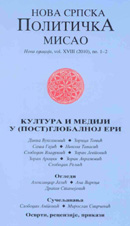| NSPM in English | |||
How the noughties were a hinge of history |
 |
 |
 |
| среда, 13. јануар 2010. | |
|
(Financial Times, December 23, 2009)
That was how the world looked to many at the end of the “noughties” of the 20th century. Yet catastrophe lay ahead: a world war; a communist revolution; a Great Depression; fascism; and then another world war. The world order – built on competing great powers, imperialism and liberal markets – proved incapable of providing the public goods of peace and prosperity. It took calamity, the cold war and the replacement of the UK by the US as hegemonic power to re-establish stability. That then facilitated decolonisation, unprecedented economic expansion, the collapse of communism and yet another epoch of market-led global integration. “History does not repeat itself, but it rhymes,” as Mark Twain is supposed to have said. The noughties of the 21st century now have the same fin de regime feeling as those of a century ago. Then the US, Germany, Russia and Japan were on the rise; now it is China and India. Then it was the Boer war; now it is the wars in Iraq and Afghanistan. Then it was an arms race between Germany and the UK; now it is the military build-up in China. Then the protectionism of the US undermined liberal trade; now conflicts between the US and China undermine our ability to tackle climate change. Then the US was isolationist; now China and other rising powers demand untrammelled sovereignty. The noughties of the 21st century were marked by historic changes. First, we are seeing at least the beginning of the end not just of an illusory “unipolar moment” for the US, but of western supremacy, in general, and of Anglo-American power, in particular. The UK was the only power with global reach in the 19th century. The US held the same role in the second half of the 20th. The transition between these two eras was a catastrophe. Now we have a possibly even more difficult transition of power to manage. Second, the west, in general, and the US, in particular, have suffered a disastrous loss of authority. Assertion of an unchecked right to intervene destroyed trust in the US. The chaos that followed the wars in Iraq and Afghanistan and, far more, the financial crisis have destroyed the west’s reputation for competence. The rest of the world was inclined to believe that the west, whatever its faults, knew what it was doing, particularly where running a market economy was concerned. But then the teacher failed the examination. Third, globalisation has also fallen into difficulty. Thirty years of surging growth in private sector leverage, in the balance sheets of the financial sector and in notional profitability of the financial sector in the US and other high-income countries has ended in calamity. The emergence of massive global current account “imbalances” has proved highly destabilising. Friction over exchange rates threatens even the maintenance of liberal trade. Fourth, the provision of basic global public goods now demands co-operation between the established powers and emerging countries. This was shown in the inability to complete the Doha round of multilateral trade negotiations; in the rising influence of the Group of 20 leading countries and the parallel decline of the Group of Seven high-income countries during the financial crisis; and in the centrality of China, the world’s leading emitter of greenhouse gases, in the climate change negotiations in Copenhagen. Yet, quite rightly, the world also demands the provision of far more public goods than a century ago. Then a modicum of peace, monetary stability and open markets was all that was expected. Now the world demands that leaders not only sustain peace and prosperity, but also promote development and environmental sustainability. All this is to be achieved via co-operation among some 200 states of vastly different capacities. Meanwhile, a host of non-state actors, some benign and many malign, impose conflicting pressures. Sometimes, they subvert states entirely. The good news is that the world has not made mistakes as big as those that followed the noughties of a century ago: thanks, partly, to nuclear weapons, direct conflicts among great powers have been avoided; a liberal world economy has survived, so far; the lessons of the 1930s were applied to the financial crisis of the 2000s, with at least short-run success; climate change negotiations remain open; and many developing countries – though far from all – have made economic progress. While the movement towards democracy of the early 1990s has slowed, the number of grossly malign totalitarian regimes is now small, at least by the worst standards of the 20th century. So where should we go in the next decade? For all its difficulties, the US is not the UK of 1910. Its economy remains the world’s most productive and innovative and its military capacity remains unmatched. The western world, as a whole, remains potent, with about 40 per cent of global output, at purchasing power parity. But other countries and forces are now on the rise, while the challenges ahead are also more complex and global than ever before. “We must all hang together or assuredly we shall hang separately.” All countries – above all, incumbent and rising great powers – must recognise this truth, enunciated by Benjamin Franklin at the signing of the US declaration of independence. History has hardly been dominated by the benign spirits of co-operation, foresight and self-restraint. I would at least give Barack Obama credit for trying to provide the right sort of leadership. But will the world produce sufficient followers, at home or abroad? Alas, I rather doubt it. http://www.ft.com/cms/s/0/1161315a-effa-11de-833d-00144feab49a.html |
Остали чланци у рубрици
- Playing With Fire in Ukraine
- Kosovo as a res extra commercium and the alchemy of colonization
- The Balkans XX years after NATO aggression: the case of the Republic of Srpska – past, present and future
- Из архиве - Remarks Before the Foreign Affairs Committee of the European Parliament
- Dysfunction in the Balkans - Can the Post-Yugoslav Settlement Survive?
- Serbia’s latest would-be savior is a modernizer, a strongman - or both
- Why the Ukraine Crisis Is the West’s Fault
- The Ghosts of World War I Circle over Ukraine
- Nato's action plan in Ukraine is right out of Dr Strangelove
- Why Yanukovych Said No to Europe

.jpg)








 The only truly global power was in rapid relative decline. Not long before, it had won a pyrrhic victory in a costly colonial war. New great powers were on the rise. An arms race was under way, as was competition for markets and resources in undeveloped areas of the world. Yet people still believed in the durability of the free trade and free capital flows that had nurtured prosperity and, many believed, had also underpinned peace.
The only truly global power was in rapid relative decline. Not long before, it had won a pyrrhic victory in a costly colonial war. New great powers were on the rise. An arms race was under way, as was competition for markets and resources in undeveloped areas of the world. Yet people still believed in the durability of the free trade and free capital flows that had nurtured prosperity and, many believed, had also underpinned peace.












